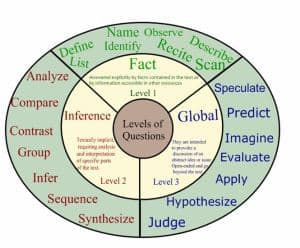This week, our class focused on creating a ‘lesson study.’ Each lesson was supposed to relate to a possible topic that we might be teaching in the near future. After meeting with a partner that had a similar topic, we discussed strengths and weaknesses of the potential lessons. Everyone seemed to have put a lot of thought into the general idea of their lesson which spawned a great classroom discussion.
Throughout the discussion process, I took so many notes about awesome future projects that I could tweak to meet my class’s needs. For example, I really like the idea of Levels of Questioning which gets students involved in creating their content objectives. (Level 1- basic content such as who, what, when; Level 2- How or why questions; Level 3- the generative question or “In your opinion…” question that asks students to reason and provide evidence.) Another idea that I want to think more about for American history was the Mock Congress idea. It seems daunting to deal with those logistics but that’s what colleagues are for!
Image from Mr. Volk’s Mad Science Website at Drake Middle School
This class is full of awesome ideas as well as some great future social studies teachers. I feel confident in others’ opinions and advice. Everyone is so willing to listen and contribute to the conversation. In terms of this last assignment, my partner definitely helped me think about some futures issues with my lesson study but, at the same time, delivered constructive criticism.
Overall, this project let me think about the more important components of putting together a lesson. I think this assignment worked well so that the class could generate new thoughts and ideas about what is necessary for student learning. I look forward to doing this when we have actual lesson plans to come up with.


The “levels of questioning” lesson was challenging. Not because of the delivery, but rather in making it relevant for the students, especially if they prefer a different note taking technique. So in order to demonstrate the value of this approach, I’ve been showing the kids how it can be used during presentations and discussions, and not just while reading; I’ve also demonstrated how the questions they develop can be used as an essay outline, which many of them found useful.
That’s a great way to look at it. I didn’t think of it like that exactly. I appreciate your idea of using in the presentations and discussions as well.
I agree that it was a fantastic idea to work with someone else to clarify and get ideas for our lesson. It is hard to work with someone else on a lesson because part of me wants to have it be mine and solely mine. It is also hard to implement something that belongs to someone else. However, collaboration is very important in the world of education. It is often left to the wayside and forgotten, leaving the students with only one perspective or one way of doing something. It was a wonderful experience to have everyone listening and weighing in with their own ideas and suggestions. At the same time, it is difficult to share that lesson plan with someone who does not have a larger idea of the class or where this lesson might be leading. It would be nice to discuss a unit and then perhaps split up ideas about a lesson within that particular unit, so that everyone involved is on the same page.